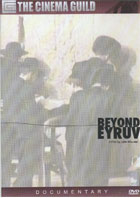
Beyond Eyruv 2006
Distributed by Cinema Guild, 115 West 30th Street, Suite 800, New York, NY 10001; 212-685-6242
Produced by John Mounier
Directed by John Mounier
DVD, color, and b&w, 72 min.
Sr. High - Adult
Jewish Studies, Religious Studies, Multicultural Studies, Social Work
Date Entered: 02/04/2009
Reviewed by Maureen Puffer-Rothenberg, Valdosta State University, Valdosta, GAThe eyruv is a thin wire strung between buildings and posts overhead in Hasidic Jewish communities; it symbolizes their separation from the world outside. Beyond Eyruv is filmmaker John Mounier’s affecting portrait of a young man who was raised as a Hasidic Jew but left to try and build a new life in the secular world.
When he turned eighteen Moshe left the Hasidic community in Israel where his parents and eight siblings lived. Moshe had been educated only in Jewish law, did not read or write English, and spoke with a heavy Yiddish accent; his life had been devoted to religious studies, intense prayer and striving for holiness. His paternal grandparents in Brooklyn pay his rent and expenses while he earns his high school equivalency diploma (GRE), and initially Moshe is thrilled with the range of books and knowledge available to him. However, over time he loses interest in education, feeling more and more lost and confused about his purpose in life. Moshe returns to Israel to live with one of his brothers and look for work, confident he will not be absorbed again into the Hasidic world; four months later he returns to the United States to work for a company owned by a Hasidic friend in Israel. Back in Brooklyn Moshe reestablishes his relationship with his grandparents and seems happier, but still feels he is searching for direction in his life.
Moshe says he was routinely beaten in school, and was molested by older Hasidic boys perhaps more than one hundred times between the ages of six and fifteen. Yet he has mixed feelings about his faith. He feels punished by God when things go badly for him, and he and his friends remain partially observant Jews, observing the Sabbath and wearing tefillin to pray (traditional containers for Hebrew Scriptures wrapped around the arm and head). Having missed out on the secular American experience of teenaged angst, Moshe is essentially an adolescent at twenty, cutting class, smoking pot, wasting his allowance, and lying to his grandfather about where he goes and what he’s doing.
Mournier’s camera follows Moshe from Brooklyn to Israel and back again, with side trips to Miami (on an abortive road trip with his friends) and to Hasidic community in upstate New York where Moshe lived as a child. Moshe, his friends and family not only gave Mournier interviews and access to family photographs and home movies—often evoking painful memories for them—but allowed Mournier intimate access to conversations and arguments revealing their sadness, frustration and pain over Moshe’s indecision. Shortly after arriving in Israel, Moshe abandons the filmmaker on the street, leaving Mournier to turn the camera briefly on himself and his own confusion.
A quick history of the Hasidim explains their origins in Europe, with archival film from the Nazi era and footage of contemporary communities. In contrast to the very orthodox Hasidic Jews, Mournier profiles Moshe’s grandfather Paul, a Holocaust survivor whose Hasidic son does not consider him to be truly Jewish.
Beyond Eyruv is highly recommended for Jewish studies programs and could also be useful to anyone working with young people from orthodox religious backgrounds. Mournier’s documentary work is informative, emotionally moving and at times even suspenseful.
The film includes scenes of drug use (Moshe and his friends smoking marijuana), profanity, discussion of sexual experience including a few profane sexual remarks, and brief full-frontal nudity in archival footage of the Holocaust.
Awards
- Best Feature Documentary, Woodstock Film Festival